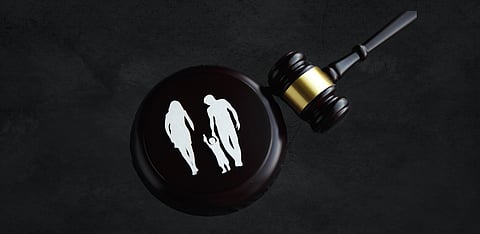

The daughter of a Gujarat-based couple was taken into the care of German child services when she was just seven months old. Since then the parents have been fighting a civil case for her custody, and have requested the Indian government to intervene so that their daughter can be repatriated to her relatives in India. This case has eerie resemblances with Mrs Chatterjee and Baby Saha cases.
—
IN what looks like Mrs Chatterjee vs Norway redux, the Pankow local court in Berlin, Germany, has granted full custody to Germany's Youth Welfare Office (Jugendamt) of a child who is the biological daughter of an India-based couple Bhavesh Shah and Dhara Shah.
The custody case began when the baby accidentally hurt herself in her private parts. Reportedly, the baby suffered injuries on her head and back in April 2021 while she was being bathed. She sustained another genital injury in September 2021 which, according to the parents, was accidentally caused by the paternal grandmother while she was visiting the family.
The court has rejected the contention of the parents that the injury suffered by the baby on her private parts was 'accidental'. According to the court, the parents "intentionally caused the serious genital injuries of the child."
The ruling against the parents came on June 16 and gave custody of the daughter to the Jugendamt.
After the second injury, when the baby was taken to the hospital, the doctor suspected her as a possible victim of sexual abuse and called the Jugendamt. She was placed in the custody of the Jugendamt on September 23, 2021, when she was just seven months old.
As the baby reached 28 months of age, the court granted custody to the Jugendamt on the grounds that the "best interest of the child was at risk" if she was returned to her family.
After an investigation, assault charges against the parents were dropped, however, the parents were accused of negligence by the authorities.
In February 2022, the case was also closed without any formal charges being framed against the parents, still the Jugendamt did not return the child to their parents. Moreover, the Jugendamt filed two cases against the parents, the first concerning the termination of parental custody and the other relating to the visitation rights of the parents.
Later in 2022, a thorough psychological evaluation of the child was done by a court-appointed psychologist who recommended that the child should be placed with either parent in a parent-and-child facility, with the other parent visiting regularly.
While the proceedings related to the recommendations made by the psychologist were in continuation, the Jugendamt shifted the baby to a facility of children with special needs, where she remains as of now.
It was reported that the parents were allowed to meet their daughter only once a month. The parents also stated that their daughter is losing her cultural and religious identity. The Jugendamt refused to give vegetarian food to the baby saying that only a non-vegetarian diet is nutritious.
The parents have stated that the Jugendamt has been intentionally dragging the case to take advantage of the continuity principle of child law. According to this, if a child has spent a considerable amount of time with a state-appointed carer, the child should not be shifted back to parents, even if the parents are found to be fit.
The parents, therefore, requested that either custody be granted to the parents or to a third party, i.e., the Indian Welfare Services. The court rejected this submission and stated that the "parents are no longer authorised to decide on the whereabouts of their child."
On June 2, in a rare show of solidarity, 59 members of Parliament (MPs) from 19 different political parties had written a joint letter to the German ambassador to India Dr Philipp Ackermann, requesting Germany to return the baby to India.
In the letter, the MPs have written that, "We have our own cultural norms. The baby belongs to a Jain family who are strict vegetarians. The baby is being brought up in an alien culture, being fed non-vegetarian food. Being here in India, you can better appreciate how unacceptable this is to us."
According to a press release on June 3, ministry of external affairs spokesperson Arindam Bagchi stated that the continued stay of the baby in the German foster care is an infringement of her social, cultural and linguistic rights. It is a cause of deep concern for the Indian government and the baby's parents, as per Bagchi.
Bagchi also stated: "We urge German authorities to do all that is necessary to send the baby to India at the earliest, which is also her inalienable right as an Indian national. We remain committed to ensuring the return to India."
Previously, two tragic cases have drawn significant limelight to the stringent child laws in foreign countries, where issues of cultural differences and religious identities often clash with the child protection laws in these countries. One such case was that of Anurup Bhattacharya and Sagarika Chakraborty.
In this case, two young children of the parents were taken into the care of the Norwegian Child Welfare Services in 2011. The children were kept with the child welfare services for over a year before they were returned to India under the custody of Bhattacharya's younger brother.
Another such case is the 2012 case of Baby Saha. An eleven-month-old baby was rushed to the hospital by his parents after he reportedly fell off the bed and suffered a severe head injury. The parents faced criminal charges over the injury sustained by the child over the alleged 'shaken baby syndrome'.
In this case, New Jersey Child Protection Services obtained a court order to place Saha in the custody of United States Child Protection Services. Eventually, a local court in New Jersey dismissed the case against the parents and the child was returned to India through an uncle.